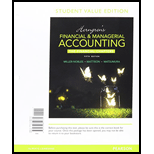
Identify the option that is not part of definition of internal control.
Answer to Problem 1QC
Option a.
Explanation of Solution
Internal control: Internal control is a process which ensures continuous reliability of accomplishment of a company’s objectives, related to operations, financial reporting, and in conformity with laws and regulations. The purposes of internal control and application of each purpose is explained as follows:
- Safeguard assets: The first purpose of internal control is to safe guard or protect assets like cash and inventory, from theft and robbery. An application of this purpose is to use physical controls like cash register and safes.
- Accuracy and reliability of accounting records: The second purpose of internal control is to enhance the reliability and accuracy, by decreasing the intentional and unintentional errors, and anomalies. An application of this purpose is to prepare bank reconciliation.
- Operational efficiency: The third purpose of internal control is to enhance the efficacy and efficiency of the business operations. An application of this purpose is to authorize responsibilities to the employees and make them accountable.
- Assurance of compliance of laws and regulations: The fourth purpose of internal control is to follow laws and regulations in compliance with the governing authorities. An application of this purpose is to document sales tax on cash tapes at the point of sale machines.
Separation of duties is not a part of internal control. But, it is an internal control procedure that is used in helping the management to find out the frauds that happen in the organization. Thus, option a. is not a part of definition of internal control and hence it is the correct answer.
Options (b), (c) and (d) form the part of definition of internal control and hence, these are incorrect answers.
Therefore, the correct answer is option a.
Want to see more full solutions like this?
Chapter 7 Solutions
Horngren's Financial & Managerial Accounting, The Financial Chapters (Book & Access Card)
 Auditing: A Risk Based-Approach (MindTap Course L...AccountingISBN:9781337619455Author:Karla M Johnstone, Audrey A. Gramling, Larry E. RittenbergPublisher:Cengage Learning
Auditing: A Risk Based-Approach (MindTap Course L...AccountingISBN:9781337619455Author:Karla M Johnstone, Audrey A. Gramling, Larry E. RittenbergPublisher:Cengage Learning Auditing: A Risk Based-Approach to Conducting a Q...AccountingISBN:9781305080577Author:Karla M Johnstone, Audrey A. Gramling, Larry E. RittenbergPublisher:South-Western College PubPrinciples of Accounting Volume 2AccountingISBN:9781947172609Author:OpenStaxPublisher:OpenStax College
Auditing: A Risk Based-Approach to Conducting a Q...AccountingISBN:9781305080577Author:Karla M Johnstone, Audrey A. Gramling, Larry E. RittenbergPublisher:South-Western College PubPrinciples of Accounting Volume 2AccountingISBN:9781947172609Author:OpenStaxPublisher:OpenStax College- Principles of Accounting Volume 1AccountingISBN:9781947172685Author:OpenStaxPublisher:OpenStax College
 Cornerstones of Financial AccountingAccountingISBN:9781337690881Author:Jay Rich, Jeff JonesPublisher:Cengage Learning
Cornerstones of Financial AccountingAccountingISBN:9781337690881Author:Jay Rich, Jeff JonesPublisher:Cengage Learning Intermediate Financial Management (MindTap Course...FinanceISBN:9781337395083Author:Eugene F. Brigham, Phillip R. DavesPublisher:Cengage Learning
Intermediate Financial Management (MindTap Course...FinanceISBN:9781337395083Author:Eugene F. Brigham, Phillip R. DavesPublisher:Cengage Learning





